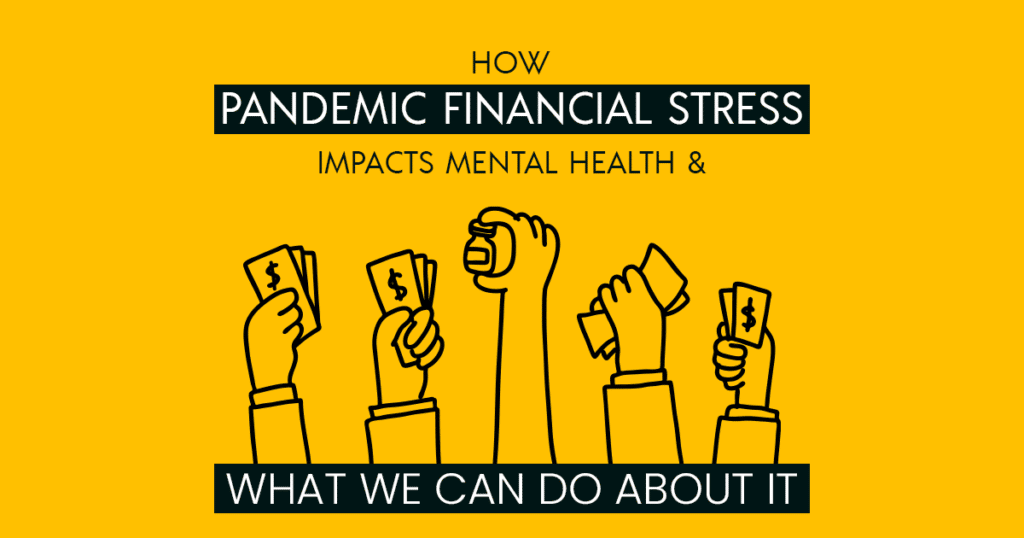As the pandemic rages, people are more stressed than ever before. Today, there’s a dual epidemic of financial pressure and desperation alongside the original one.
It’s difficult to quantify the maelstrom of emotions most people feel because many of us are silently suffering. Perhaps rightly so, news media tends to focus on the easily quantifiable measures of the last two years: hospitalizations, rising cases, and so on. However, the effects of pandemic financial stress are real and felt around the world.
Pandemic Financial Stress
Tens of millions of people lost their jobs at the beginning of the pandemic. Additionally, a large percentage of our population has been living off of minimal government support for almost two years, which has wreaked havoc on our collective wallets and our psyche.
Add on top of that a high cost of living and accumulating bills, and you have a recipe for disaster. If you made a graph of our collective stress levels, they’re trending upwards at an alarming rate, and that pattern can only continue for so long before something starts to give.
We need to equip ourselves with strategies to counteract this global rise in cortisol before it exerts long-term effects that we will feel for decades. This article will discuss pandemic financial stress and what we can do about it.
Let’s get started.
Mental Health Center of San Diego
Understanding Pandemic Financial Stress
Unless you’re Jeff Bezos or Elon Musk, you’ve probably been negatively affected financially by the pandemic. Aside from a few statistical outliers, the majority of the lower and middle classes have felt squeezed with higher rents, increased food prices, and a lack of job availability. All of this has led to record stress levels and a subsequent decrease in quality of life.
A 2007 survey by the American Psychological Association highlighted financial issues as one of the top causes of psychological stress, independent of economic status. Stress can have real, measurable impacts on your life, from shorter life expectancies to more strained relationships and more.
Many households today affected by the country’s rapid unemployment rates and unstable job security rely on financial support provided by the government. However, many say the support has been insufficient and frustrating. Families are struggling to make ends meet fall through the gaps in the safety net, leaving them hungry and financially insecure.
Without a doubt, the COVID-19 pandemic continues to stress and substantially impact the lives of many Americans. Keep an eye out for these common symptoms:
- Unexpected weight gain or loss
- Difficulty sleeping
- Having trouble enjoying regular activities
- Digestive problems
- Stress, anxiety, and panic attacks
- Possible avoidance behaviors (e.g., avoiding looking at bills)
- Unhealthy coping mechanisms (e.g., heavy drinking)ƒ
The result is clear: pandemic financial stress does not significantly differ from other forms of stress in that it negatively affects your well-being, mental and physical health, and relationships.
Tips to Manage Pandemic Financial Stress
Pandemic financial stress is overwhelming, to be sure. However, learning to manage your finances and building stress management coping mechanisms can do wonders in gaining back a sense of control of your life. Below are some helpful tips for managing pandemic financial stress in a healthy, consistent way.
Focus on What is Controllable
Although it sounds cliché, the first step is to see the silver lining in your situation. Things will inevitably improve; it is simply a factor of time. In nearly every pandemic recorded to date (and there have been many), human society has always rebounded within a handful of years. Ours, too, shall pass.
So while it’s certainly valid to acknowledge your financial worries, zooming out and appreciating the big picture is equally important. It’ll help you stop focusing on the negatives and begin looking for solutions to improve your current situation.
Once you’re in the right headspace, consider your financial situation; how much debt are you in? What’s your current monthly income? Do you have ways to decrease extraneous expenses or improve the amount of money you generate?
Once you have a list of actionable steps, you can begin implementing them. For example, you can lessen your debt, rearrange your current budget, or improve your career knowledge to boost income. Engaging in these steps will make you feel less stressed and more in control of your financial destiny.
Create a Reasonable Budget
With the ongoing pandemic, it’s a fact of life that some of your financial decisions will need to change.
Decreased income is the biggest factor; with less money coming in, you’ll probably have to re-budget your current expenditures to achieve an equilibrium.
Tracking your finances is critical here. Knowing how much money comes in and out of your account and separating the essentials from non-essentials offers you the opportunity to budget in a financially stable way and will give you untold confidence in the future. Stability lessens the risk of overspending that may cause further financial stress.
Mental Health Center of San Diego
Acknowledge Financial Debt
It can certainly be stressful to think about the debts you have to pay or the time spans involved in paying them back. But there’s no better time to start anything than today. Acknowledging how much debt you have and taking stock of what you owe is the first step to solving that problem.
After you’ve tallied your debt, you can begin looking for immediately actionable solutions. For example, you might refinance your loan at a lower rate, or pay off a high-interest credit card first to save you more money. Interest payments often grow uncontrollably and can consume most of your income if you’re not careful, so keeping your debt in check helps you keep your finances under control.
Track Financial Progress
Taking note of your progress is helpful because reaching your financial goals, paying off your debt, and increasing your savings gets you in a positive psychological loop.
Such loops lessen the pandemic financial stress and make it more likely that you’ll engage in positive behaviors in the future. But if you don’t track your financial goals, you may not realize just how much progress you’re making – and you’ll miss out on a crucial opportunity for positive self-talk.
Manage Stress And Cortisol
Once you’re sure you’re doing everything you can to directly manage your finances, it’s time to look at improving stress management more generally.
Strong coping mechanisms are every bit as important as strong financial health. Many rich people suffer from debilitating stress because while they’ve figured out their finances, their stress management skills have a lot to be desired.
The Centers for Disease Control and Prevention (CDC) recommend these ways to manage stress properly:
- Take a break from social media and watching/reading the news
- Make healthy diet choices and exercise
- Get a proper amount of sleep
- Avoid drinking and smoking
- Let yourself relax from time to time
- Reconnect with, or build, new hobbies in your life
- Focus on things you can measurably improve on
Communicate Your Stress
Lastly, acknowledge the fact that you’re not alone. Seek support from people you trust by opening up about your pandemic financial stress, and understand that many of them are going through the same thing as you are.
Your friends and loved ones can reassure you that your concerns are valid and realistic. Having them understand what you’re experiencing will also help reduce tension in your relationships, and may elucidate why you’ve been acting differently than before.
Mental Health Center of San Diego
Getting Help for Your Mental Health
Alongside the original COVID-19 pandemic, we have also found ourselves in a pandemic of financial stress. Hundreds of millions of people are currently experiencing negative side effects on their mental health that directly stem from their financial outlook.
In uncertain economic times with increased job insecurity, high unemployment rates, and climbing prices, it is completely understandable if you’re experiencing this too. However, by acknowledging your current financial situation, setting budgets, building coping skills, and connecting with the people around you, you can help offset the financial stress of the pandemic and build a brighter tomorrow.
If you need help managing your stress or anxiety, the Mental Health Center of San Diego can help, simply call (858) 258-9883 and talk to a team member.
Has financial stress affected you recently? Feel free to share your own tips on how you’ve been managing. Let us know what you think in the comments.









